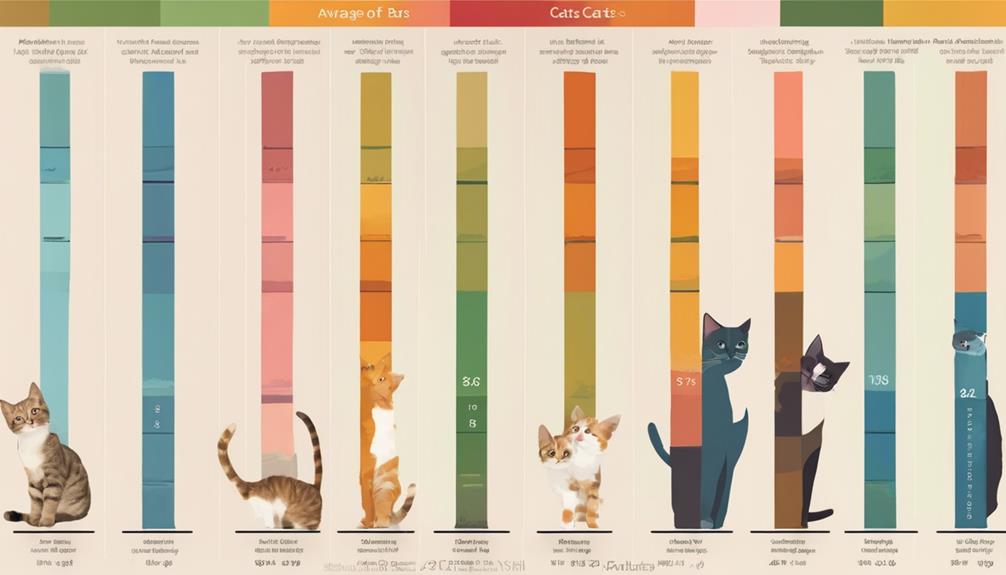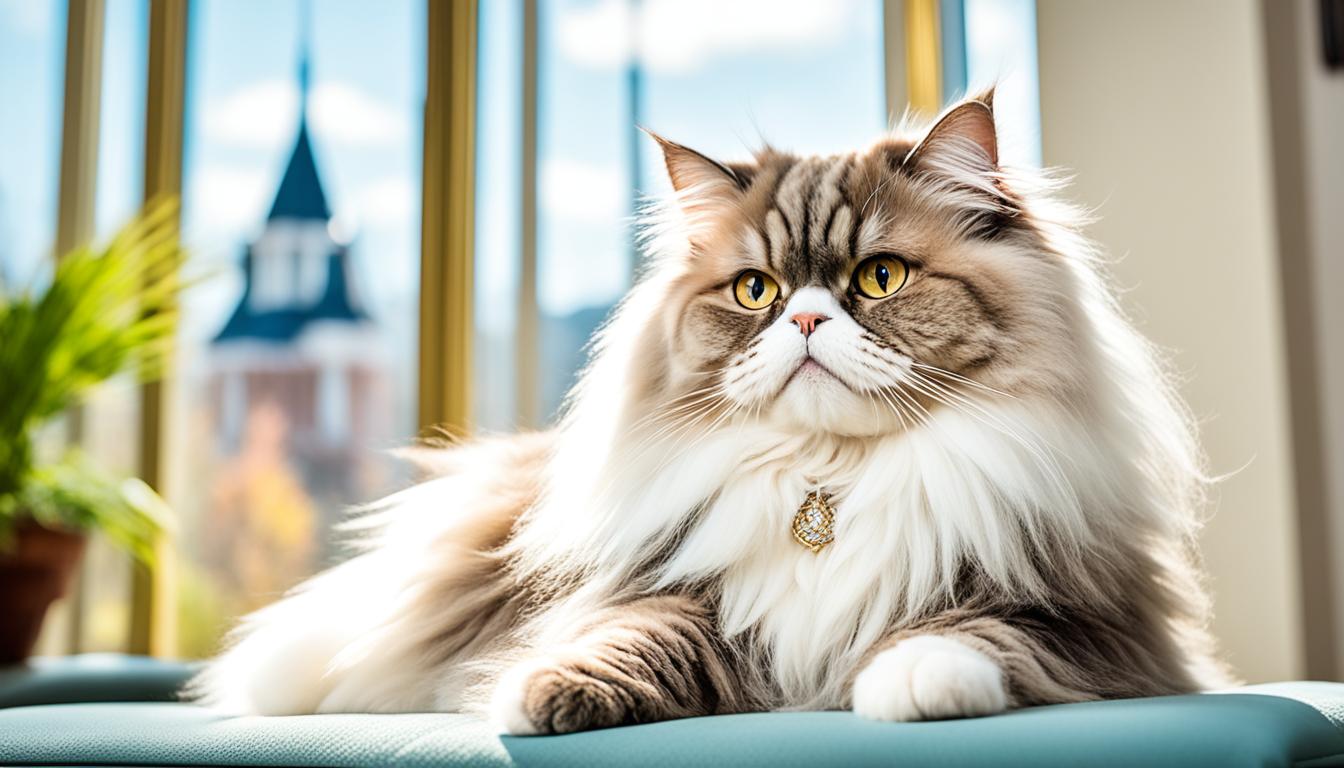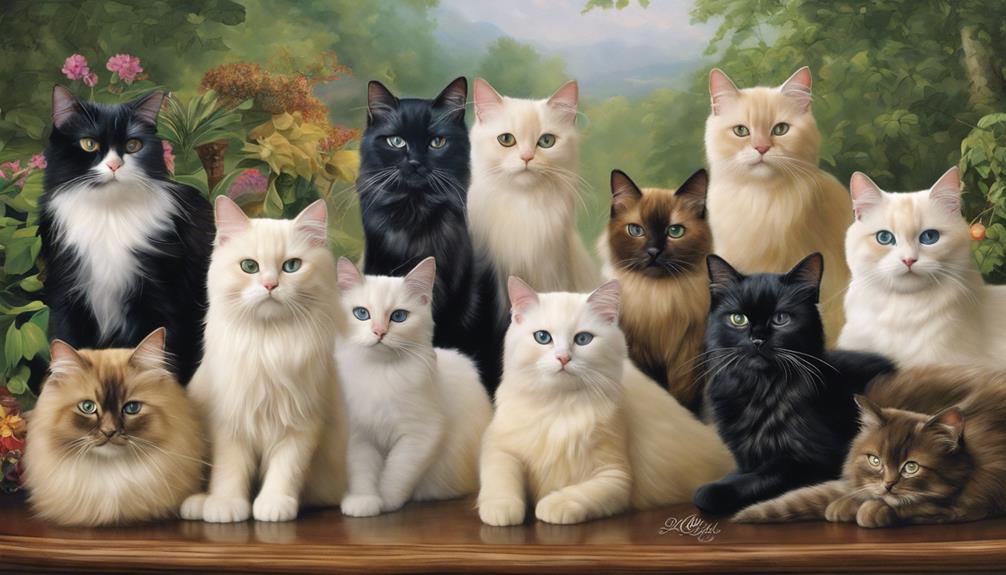When keeping track of your cat’s weight from kitten to senior years, the average weight ranges by age provide important insights. Newborn kittens typically weigh around 2% of their mother’s weight, so ensuring proper nurturing is essential for healthy growth. Adolescent cats experience rapid growth spurts, making it important to monitor their food intake to support proper weight gain. Adult cats usually weigh between 4.1 kg to 5.6 kg, with breed-specific tendencies. Senior felines typically weigh between 7 to 9 pounds, where muscle loss can impact weight. Examining the detailed weight chart provides a deeper understanding of your cat’s well-being and health journey.
Key Takeaways
- Newborn kittens weigh around 2% of mother's weight.
- Rapid weight gain is crucial for healthy growth.
- Senior cats typically weigh between 7 to 9 pounds.
- Monitoring weight helps detect health issues early.
- Adjust diet and exercise for senior cat weight management.
Newborn Kitten Weight Chart
Newborn kittens typically weigh around 2% of their mother's weight. This rapid weight gain is vital for their healthy growth and development. Proper feeding is essential during this stage to make certain they receive the necessary nutrients from their mother's milk or a milk replacer formula if needed.
Monitoring their weight gain is a great way to track their progress and overall health. By keeping a close eye on their weight, we can confirm they're on the right track for healthy growth. Making sure they're feeding well and gaining weight steadily is key to setting them up for a strong start in life.
Weighing Your Growing Kitten
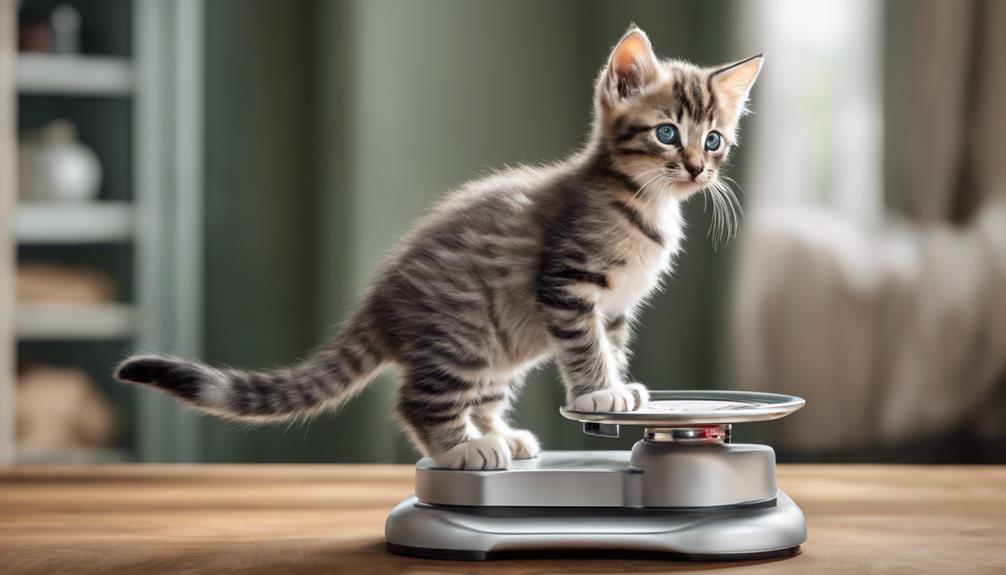
As kittens grow, monitoring their weight becomes essential for guaranteeing their healthy development and well-being. A kitten's weight can provide valuable insights into their overall health and whether they're growing at a steady pace.
To accurately track your kitten's growth, using a simple bathroom or kitchen scale can be quite effective. We recommend weighing your kitten at least twice a day to get a good sense of their weight fluctuations. Remember to subtract the weight of the container from the total weight to get an accurate reading.
By keeping a chart of your kitten's weights over time, you can easily track their progress and detect any potential issues early on. Healthy kittens typically gain around 100g per week until they reach their adult weight, so monitoring this growth is vital.
Adolescent Cat Weight Guide
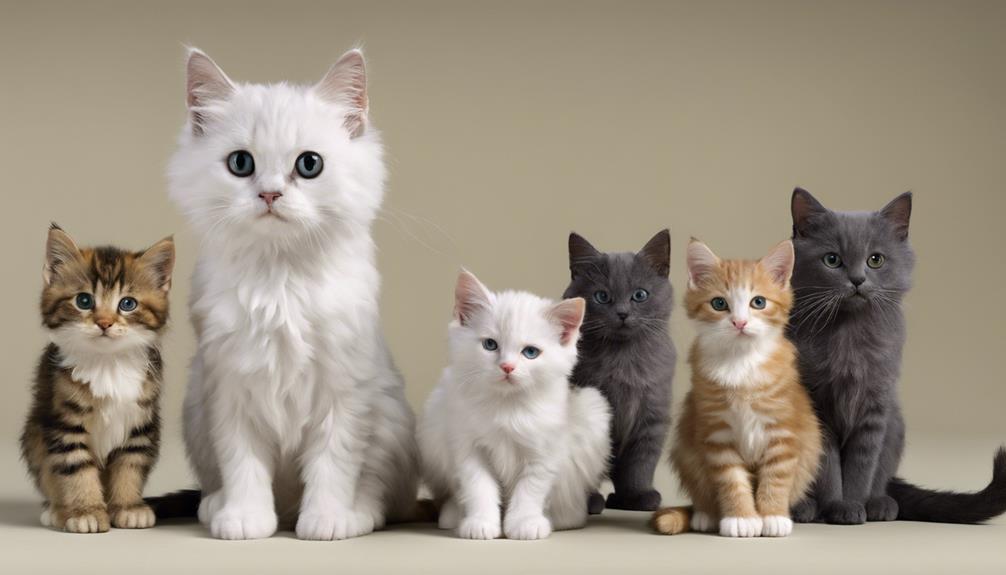
As adolescent cats experience growth spurts, their weight can fluctuate, making it important to monitor their food intake closely.
This period is vital in ensuring they develop properly and reach a healthy adult weight range.
Growth Spurts in Adolescence
During adolescence, cats undergo rapid growth spurts that may result in significant weight gain. These growth spurts, typically occurring between 6 to 12 months of age, can see adolescent cats putting on up to 1 pound per month. It's a pivotal phase for them to reach their adult weight and size.
Providing proper nutrition during this time is essential to support healthy weight gain in cats. Ensuring they receive the right balance of nutrients will help them grow strong and healthy. Monitoring their weight changes throughout these growth spurts is necessary to guarantee they're developing correctly.
Monitoring Food Intake
Shifting from adolescence to adulthood, keeping an eye on the food intake of adolescent cats is important to maintaining a healthy weight and supporting their growth. As adolescent cats shift to adult food around 6 months old, monitoring their portion control becomes essential.
It's essential to prevent overfeeding and consider the calorie content of their food to avoid excessive weight gain. Consulting with a veterinarian for guidance on the right feeding schedule and portion control for adolescent cats is highly recommended.
Proper nutrition during this stage is key for their best growth and development. By being mindful of their food intake and following the guidelines on the cat weight chart, we can make sure our adolescent feline friends grow up healthy and strong.
Adult Cat Weight Standards

Considering various factors such as breed, life stage, physical condition, and sterilization status, adult cat weight standards typically range from around 4.1 kg to 5.6 kg. It's noteworthy that each cat is unique, and their weight can vary within this range. Factors like genetics, diet, and exercise play a significant role in determining where your adult cat falls on this spectrum.
Different cat breeds also have specific weight tendencies. For instance, a Maine Coon is generally larger and heavier compared to a Siamese cat. Monitoring your adult cat's weight is vital to make sure they're healthy and at an ideal weight for their breed and size.
Furthermore, a cat's physical condition, whether they're more muscular or lean, can affect their weight. Regular check-ups with a veterinarian can help you track your cat's weight and make any necessary adjustments to their diet or exercise routine. By staying informed about your adult cat's weight and overall health, you can guarantee they lead a happy and healthy life.
Senior Cat Weight Considerations
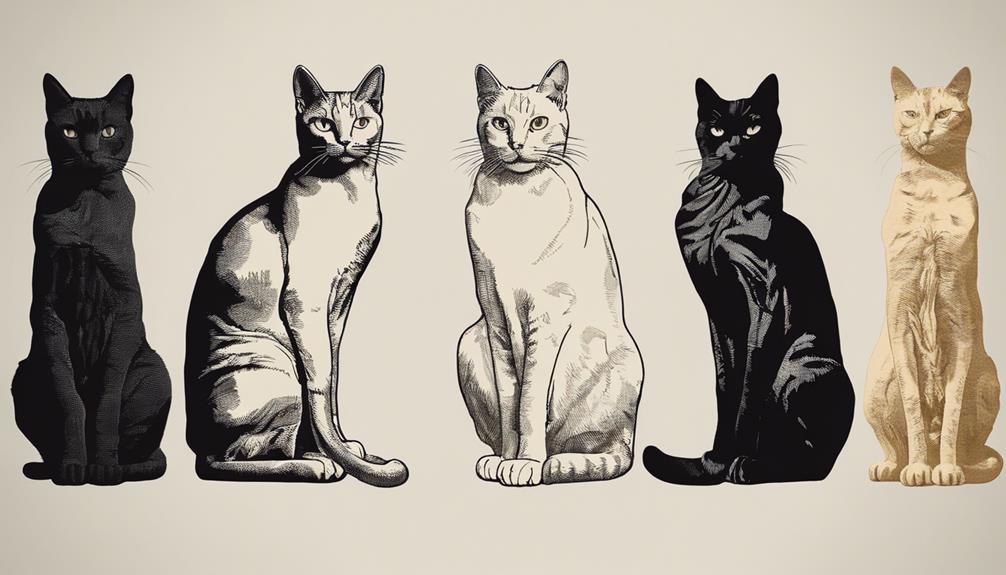
As we explore Senior Cat Weight Considerations, it's important to understand that senior cats typically weigh between 7 to 9 pounds on average. When caring for our senior furry companions, it's essential to be attentive to their weight to guarantee their well-being.
- Weight Loss Signs Health Issues: Weight loss in senior cats can indicate underlying health problems like hyperthyroidism or kidney disease. Keeping an eye on any fluctuations in weight is crucial for early detection of potential issues.
- Muscle Loss Impact: Muscle loss and reduced activity levels can contribute to changes in a senior cat's weight. Encouraging light play and providing appropriate nutrition can help maintain muscle mass.
- Regular Check-ups Matter: Regular veterinary check-ups are essential for monitoring senior cats' weight and overall health. These visits allow for adjustments in diet and exercise routines to support a healthy weight and quality of life.
Monitoring Kitten Weight Progress
Monitoring the progress of a kitten's weight is vital for guaranteeing their healthy growth and development. Healthy kittens typically gain around 100 grams per week until they reach their adult weight.
Weighing kittens at least twice daily helps us confirm they're on track for healthy weight gain. In the first week, kittens should double their birth weight, gaining about 0.5 to 1 ounce per day. By regularly recording kitten weights, we can aid in identifying any potential health issues early on.
It's essential to monitor their weight gain to make sure they're thriving and growing as they should. Keeping a close eye on their weight progress allows us to intervene promptly if we notice any deviations from the expected growth pattern. Remember, a healthy weight is a good indicator of a kitten's overall well-being, so tracking it diligently is key to their long-term health.
Understanding Cat Weight Changes
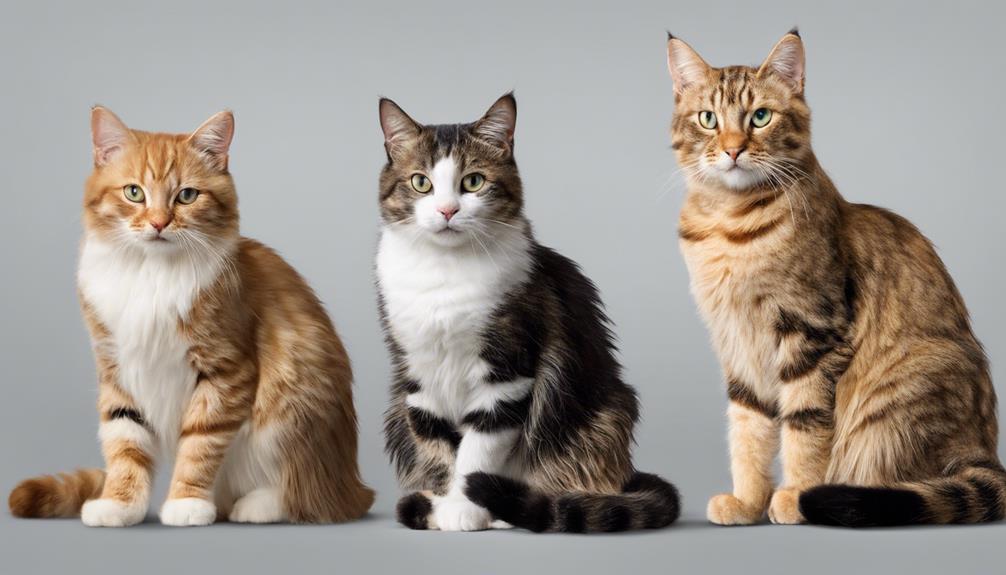
After closely monitoring the weight progress of kittens to guarantee their healthy growth, it's essential to comprehend how cat weight changes as they evolve into adulthood. Understanding these changes can help us make sure our feline companions stay healthy and happy throughout their lives.
- Kitten Weight: Kittens experience rapid weight gain in their early weeks, doubling their birth weight within the first week. This growth is vital for their development.
- Body Condition Score: Monitoring your cat's body condition score is crucial to determine if they're at their ideal weight. This score helps assess their overall health and well-being.
- Overweight Cat: Being overweight can lead to various health issues in cats, such as diabetes and joint problems. It's important to manage your cat's weight to prevent these complications and ensure a long, healthy life.
Maintaining Healthy Adult Cat Weight
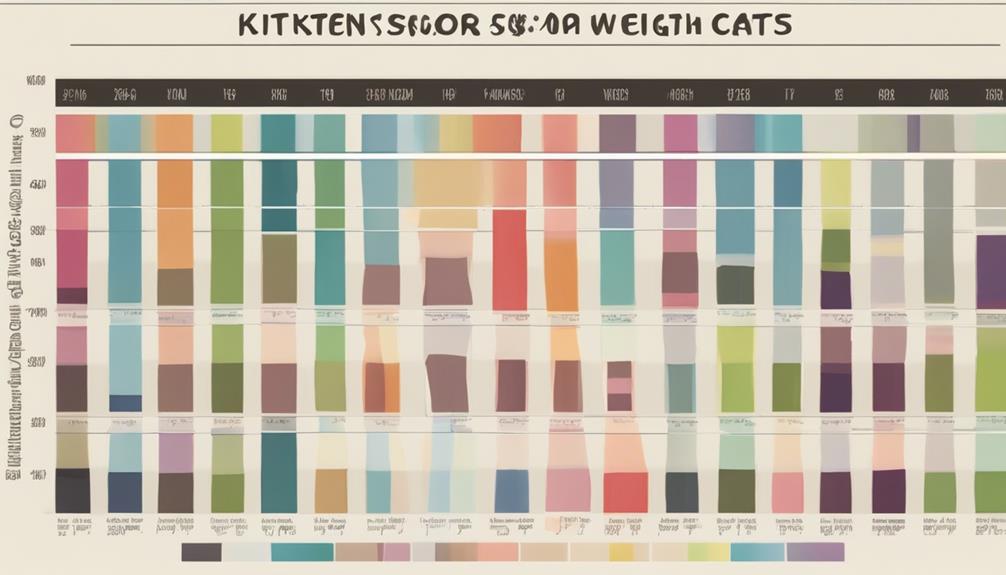
To guarantee our adult cats maintain a healthy weight, it is important to comprehend their ideal weight range and factors influencing it. Keeping our feline friends at a healthy weight not only ensures they look and feel their best but also reduces the risk of obesity-related health problems. Below is a table outlining the ideal weight range for adult cats and tips for weight management:
| Ideal Weight Range | Tips for Weight Management |
|---|---|
| 8 – 10 pounds | Provide balanced nutrition |
| Engage in regular play sessions | |
| Monitor food portions | |
| Consider interactive toys |
Senior Cat Weight Management Tips
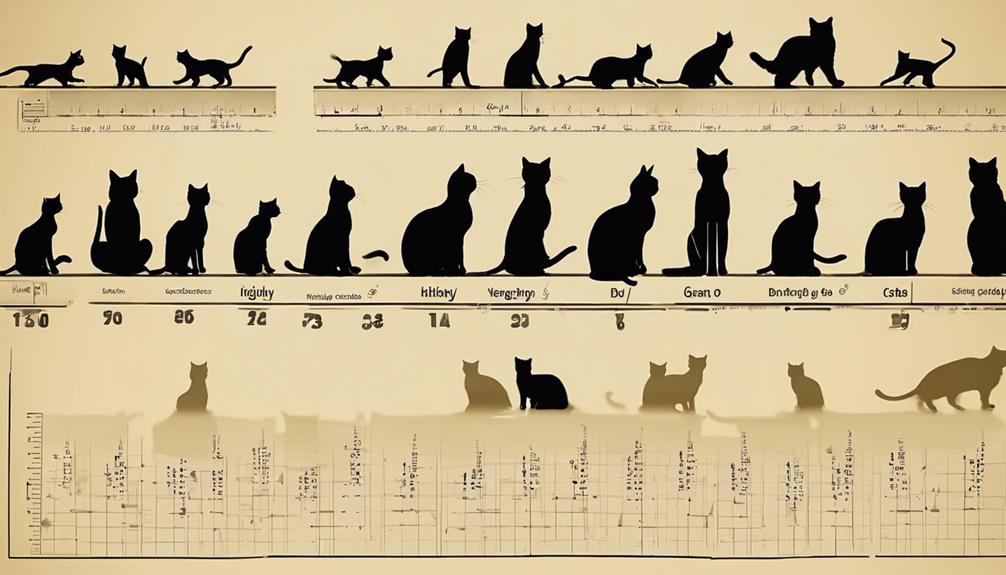
As senior cats age, they may need adjustments in their diet and exercise routine to maintain a healthy weight. Monitoring their weight regularly is key to catching any health issues early.
Consulting with a veterinarian can help tailor a personalized weight management plan for senior felines.
Diet for Older Cats
When managing the weight of older cats, considering a diet with lower calories is vital to promote their overall health and prevent weight gain. To guarantee senior cats maintain a healthy weight, it's important to focus on the following:
- Opt for senior cat food formulas tailored to their nutritional needs.
- Feed a balanced diet to support weight management.
- Increase fiber intake to aid digestion and prevent obesity.
Exercise for Seniors
When managing the weight of older cats, considering a diet with lower calories is important to promote their overall health and prevent weight gain. Opting for senior cat food formulas tailored to their nutritional needs is vital.
Now, let's shift our focus to discussing the importance of exercise for seniors in maintaining their weight. Senior cats may require tailored exercise routines due to age-related changes in mobility and energy levels. Engaging senior cats in low-impact activities like gentle play sessions or interactive toys can help maintain their weight and muscle tone.
It's essential to make sure that senior cats get regular, moderate exercise to prevent obesity. Consulting with a veterinarian to create a suitable exercise plan based on your senior cat's health and physical condition is highly recommended for their well-being.
Checking Kitten Weight Regularly
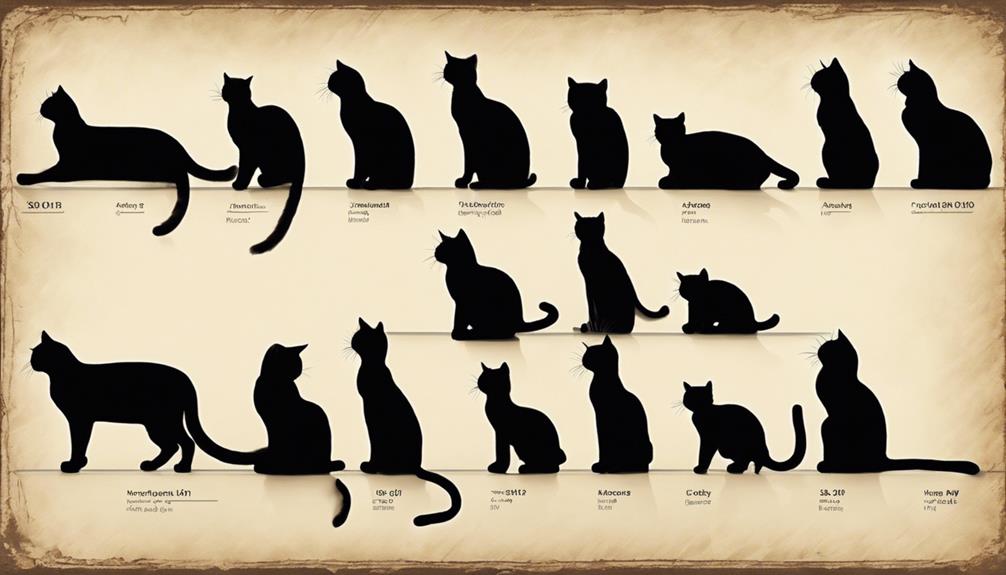
Regularly weighing kittens at least twice daily is essential to accurately track their growth and health progress. Here are some key points to keep in mind:
- Use a precise scale and a container: Ensuring accurate measurements when weighing your kitten is important for monitoring their development effectively.
- Record weights regularly: Keeping a log of your kitten's weight helps in identifying any fluctuations early on and provides valuable information for vet visits.
- Keep kittens still during weighing: Consistency in measurements is vital, so try to keep your kitten calm and still during the weighing process.
Ideal Weight for Adult Cats
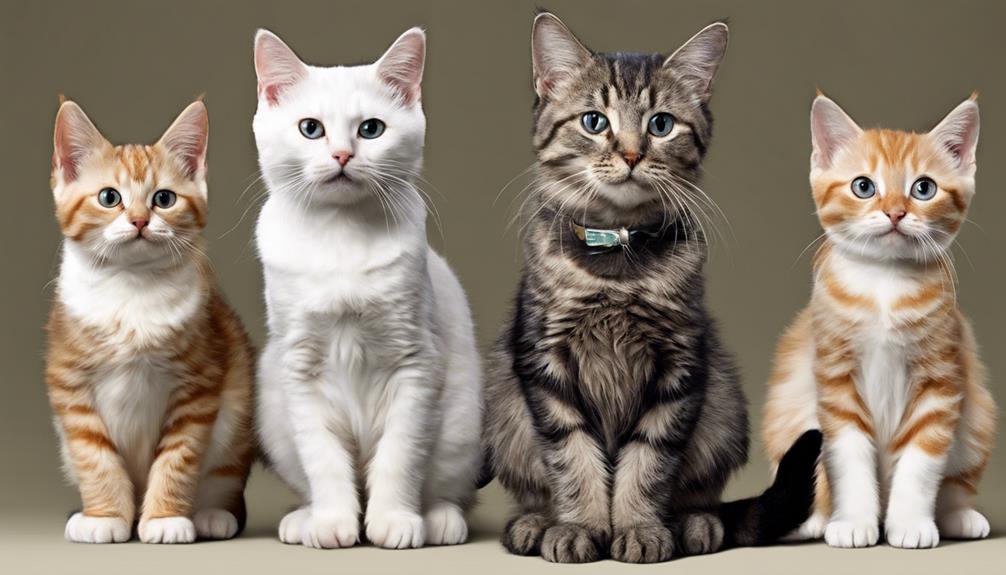
To maintain peak health, adult cats should ideally weigh around 9 pounds on average. The ideal weight for adult cats is influenced by factors such as breed, life stage, and overall physical condition. It's important to monitor your cat's weight regularly to make sure they're within the healthy range.
Around one year old, cats typically stabilize their weight, with the average 2-year-old cat weighing approximately 9 pounds. As cats age, their ideal weight may slightly increase. By the time they reach 6-7 years old, the average adult cat weighs around 12.3 pounds.
Keeping your cat at an ideal weight is essential for their overall well-being and longevity. Consult a weight chart specific to your cat's breed and age to help you determine the ideal weight range. Remember, maintaining a healthy weight through proper diet and regular exercise is key to ensuring your cat lives a happy and healthy life.
Assessing Senior Cat Weight Issues

As senior cats age, evaluating their weight becomes important to identifying potential health issues they may be facing. Senior cats may experience weight loss due to various factors such as dental issues, decreased muscle mass, and medical conditions.
Regular monitoring of senior cat weight is vital to detect any sudden or significant changes that may indicate health problems. Senior cats may require a different diet tailored to their age-related needs to maintain a healthy weight and overall well-being.
Weight gain in senior cats can be a concern, as it may lead to obesity and exacerbate age-related health issues. Consulting with a veterinarian for guidance on managing senior cat weight issues can help address any underlying health concerns effectively.
Factors Affecting Kitten Weight
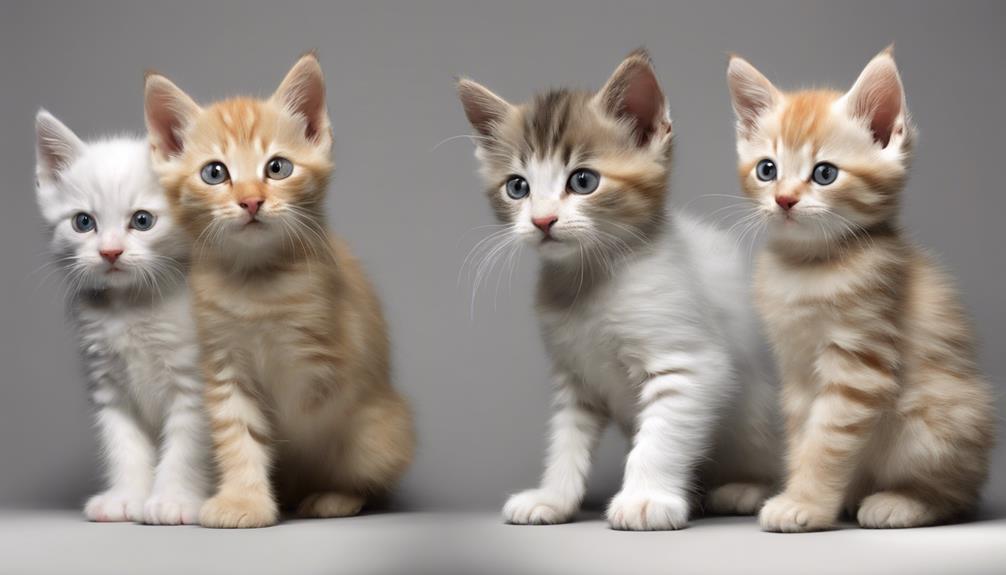
Senior cat weight management is essential for their health, and similarly, understanding the factors affecting kitten weight is crucial for their well-being. A healthy kitten is typically around 2-4 pounds at eight weeks old and should gain about 1 pound per month during their first few months. Factors such as breed, genetics, diet, and overall health play a significant role in how much weight a kitten should gain. Making sure a kitten is at their ideal body weight is important for their growth and development. Here is a breakdown of some key factors influencing kitten weight:
| Factor | Description | Impact |
|---|---|---|
| Breed | Different breeds have varying growth rates and body sizes, affecting how much weight they should gain. | Some breeds may naturally be smaller or larger. |
| Genetics | Genetic factors can influence a kitten's metabolism and body composition, impacting their weight. | Kittens may inherit traits affecting their size. |
| Diet | A balanced diet with proper nutrients is essential for a healthy kitten, influencing their weight gain. | Poor nutrition can lead to stunted growth. |
| Health | Illnesses, parasites, or stressors can hinder a kitten's weight gain, requiring veterinary attention. | Monitoring health is important for a growing kitten. |
| Littermates | Competing for food among littermates can affect how much a kitten eats, potentially influencing weight. | Making sure each kitten gets adequate nutrition is key. |
Understanding these factors can help guarantee your kitten grows into a healthy adult cat.
Evaluating Adult Cat Weight Status
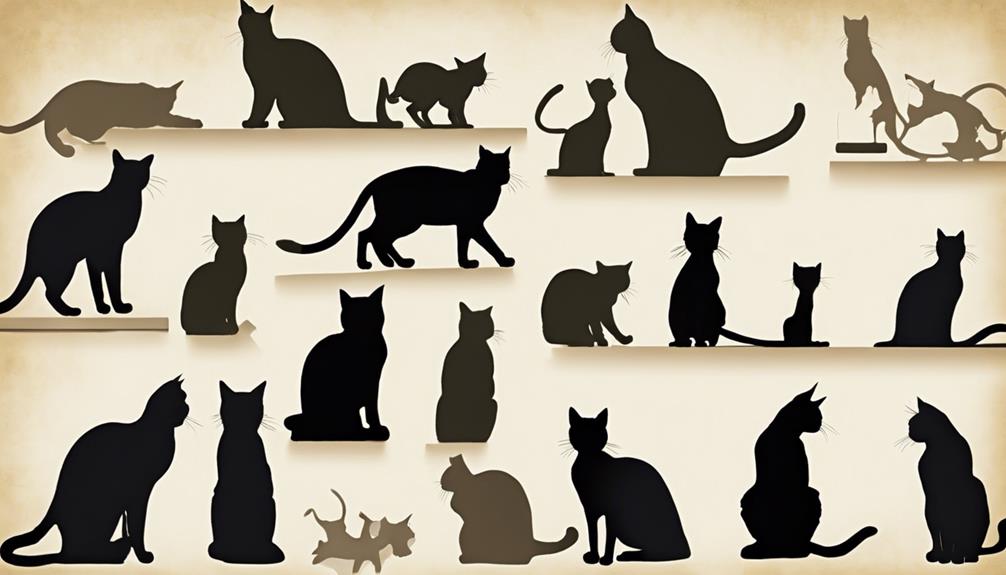
When evaluating the weight status of adult cats, it's important to take into account factors such as diet, physical activity, and any underlying health conditions that might affect their overall well-being.
- Regular Exercise: Engaging adult cats in play and exercise helps maintain a healthy weight and promotes overall well-being.
- Balanced Diet: Providing a well-balanced diet tailored to your cat's nutritional needs can prevent weight issues and guarantee they stay at their ideal body weight.
- Veterinary Check-ups: Regular visits to the vet are essential for monitoring your cat's weight and discussing any concerns about obesity or changes in weight.
Understanding your cats' weight and body condition is essential in determining if they're at their ideal weight. Cats that are obese, weighing over 20% of their ideal body weight, are at risk of various health issues. By keeping a close eye on their weight, diet, and exercise routine, you can help your adult cat maintain a healthy weight and live a long, happy life.
Senior Cat Weight Chart Analysis

As we examine the Senior Cat Weight Chart, it's important to note that weight changes in senior cats can indicate underlying health issues. Maintaining a stable weight within the 7 to 9 pounds range is essential for their well-being.
Adjusting their diet and seeking veterinary advice promptly are key considerations for senior cat owners.
Senior Cat Weight Changes
One common observation regarding the weight changes in aging cats is the noticeable shift in their body composition.
- Senior cats may experience weight gain due to reduced activity levels and changes in dietary needs.
- Conversely, weight loss in senior cats can signal underlying health issues like kidney disease, hyperthyroidism, or dental problems.
- Monitoring a senior cat's weight regularly is important for early detection of changes and addressing any health concerns promptly.
As our feline friends age, fluctuations in weight can be indicative of various health conditions. Understanding these changes and working closely with a veterinarian to manage your senior cat's weight is essential for their overall well-being and longevity.
Health Implications
Understanding the health implications of senior cat weight through a comprehensive chart analysis is essential for ensuring their well-being and longevity. As senior cats age, they may experience weight loss due to a decrease in muscle mass, which can lead to various health issues. Monitoring their weight closely is vital as it can be a sign of dental problems, hyperthyroidism, or kidney disease in older felines. To highlight the importance of this issue, below is a table illustrating the potential health implications of weight loss in senior cats:
| Health Implication | Description |
|---|---|
| Dental Problems | Weight loss can signal dental issues |
| Hyperthyroidism | Thyroid conditions may cause weight loss |
| Kidney Disease | Renal issues can lead to weight decrease |
| Muscle Mass Decrease | Reduced muscle mass may contribute to weight loss |
Dietary Considerations
Monitoring senior cat weight through a dietary analysis is crucial for maintaining their health and managing potential weight-related issues effectively. When considering dietary needs for senior cats, it's important to take into account factors such as slower metabolisms and the potential for weight gain. Here are three essential dietary considerations for senior cats:
- Adjusting cat food to meet reduced calorie intake requirements.
- Increasing fiber in their diet to aid in weight management.
- Seeking guidance from a veterinarian for personalized senior cat diet recommendations.
Taking these steps can help guarantee that senior cats maintain a healthy weight and overall well-being as they age.
Frequently Asked Questions
How Much Should a 12 Week Old Kitten Weigh in Pounds?
At 12 weeks, a kitten should weigh between 2.2 and 3.3 pounds on average. Monitoring their weight is vital for promoting healthy growth. If you observe any significant deviations, seek advice and support from a vet.
Is a 5 Month Old Kitten 7 Pounds?
We've had kittens around that age hit the 7-pound mark, but remember, weight can vary. Keep an eye on growth trends, consult your vet if needed. Healthy ranges differ; diet and activity levels matter.
How Old Is a Kitten by Weight Lbs?
Weighing a kitten in pounds to determine age isn't always accurate. Kittens grow at various rates. But generally, a 4-week-old kitten is around 0.4 to 0.8 pounds, 2-3 months old can be 1.3-1.8 pounds, and so forth.
Is 12 Pounds Overweight for a 1 Year Old Cat?
We think 12 pounds on a 1-year-old cat might be healthy, but every cat is unique. It's important to consult a vet to guarantee your furball's well-being. Regular weight monitoring helps us keep our beloved pets in top shape.
What is the Average Weight for a 19-Year-Old Cat in Human Years?
At 19 years old, the average weight of a cat is around 10 pounds in human years. This can vary depending on the breed and individual health. To convert cat years to human years, it’s useful to keep in mind that the first year of a cat’s life is equivalent to about 15 human years.
Conclusion
In essence, monitoring your cat's weight throughout their life is essential for their health and well-being.
Just like a compass guides us on a journey, a cat weight chart directs us in ensuring our feline friends lead long and healthy lives.
Stay vigilant, keep track of changes, and consult with your veterinarian if needed.
Remember, a cat's weight is like a map – it helps us navigate their journey to peak health.
